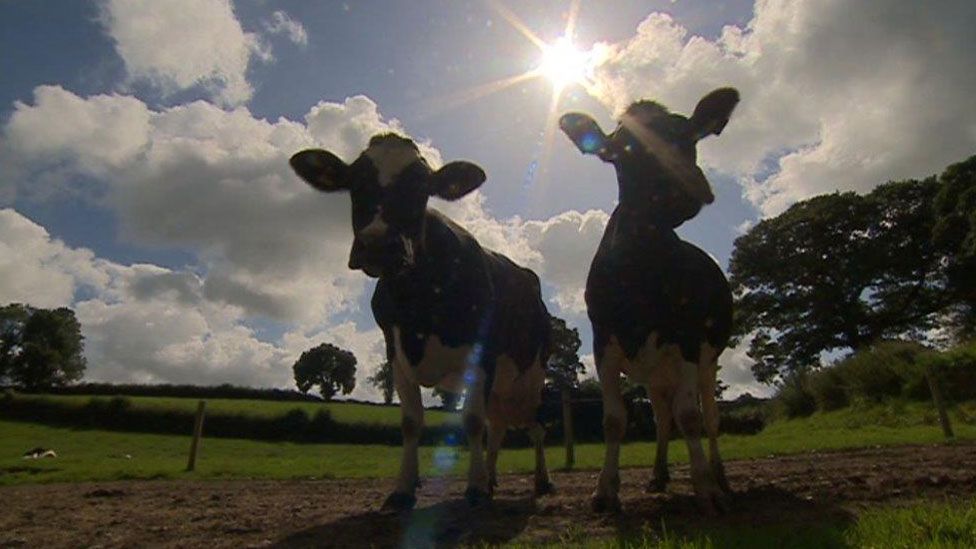Brexit: Full farming devolution urged for Wales
- Published

Funding to support farmers after Brexit must be handed directly to Wales and spent in full on agriculture, an Assembly committee has said.
The climate change, environment and rural affairs committee set out priorities after a post-Brexit inquiry.
It warned of a "lack of clarity" about how current European Union powers would be devolved.
Committee chairman, UKIP AM Mark Reckless, said Wales must not lose out after the vote to leave the EU.
The Welsh Government said it was "encouraged" to see cross-party support for many of the principles it had set out in its White Paper, Securing Wales' Future, and had raised during its negotiations with the UK Government.
For most farmers in Wales, the direct payments they receive from EU funds make up the majority of their income, accounting for an average of 81% net Welsh farm profit in 2014-15.
After the UK leaves the EU, the committee said that future agricultural funding should not be subject to Barnett formula calculations in Westminster but handed straight to the Welsh Government.
It in turn "must spend this level of funding in full on agriculture".
Wales is expected to receive a total of £1.69bn (1.95bn euros) in direct payments from the EU for 2014-2020; this equates to an average of £242m (279m euros) per year.
In addition, £567.7m (655.8m euros) is set to be handed down during the same period in funding for rural development and agri-environmental schemes.
Any move to change from direct payments for farmers to a new system of grants after Brexit should be phased in over a period covering both the current and next cycles of EU funding up until 2027, the committee said.
It concluded that continued financial support for farmers would be vital.
"Funding for farmers results in a significant multiplier from which the rural economy benefits," the report says.
"We saw this first-hand when we visited a farm in Ceredigion during our inquiry - that farm had made payments to 123 businesses in 2015-16, 95 of which were based locally."
Helping farmers manage the landscape also attracts tourists and supports the language and culture of Wales, AMs said.
The committee said that "innovative, made in Wales" farming policies would be key.
And that a future system of payouts should be more Wales-specific, incentivise farmers to help the environment and "minimise bureaucracy".
The report welcomed a commitment by the UK Government that the devolution settlement would not be affected by Brexit but warned of a "lack of clarity" about how this would work in practice.
Control of farming and the environment is devolved to the Welsh Government.
In future, it may be "necessary and desirable" to have UK-wide regulatory frameworks, such as for animal health and welfare standards, the report said.
But these "must be agreed by all UK governments - not imposed from the centre".
The report also calls for Wales to have "an equal voice at the negotiating table", warning that failure to protect Welsh interests on trade could severely impact producers.
Committee chair Mr Reckless said Brexit had presented the chance for Wales to mould its own farming policies.
"But we can only take advantage of this opportunity to reinvigorate our rural communities by ensuring that we, in Wales, do not lose out as a result of the vote to leave."
"In the longer term there is an opportunity to develop innovative, ambitious policies, made in Wales to make the sector more outcome-focused with climate, biodiversity and the sustainability of rural life at the heart of any decisions."
The committee makes 26 recommendations in its report, which was "broadly welcomed" by farming union NFU Cymru.
UK ministers responsible for farming had been criticised by the committee in February for "an apparent refusal to engage" with its inquiry.
The UK Government said that it was in regular dialogue with the industry in Wales.
The Welsh Government said Brexit "presents us with an opportunity to create distinct, made-in-Wales policies for the environment and agriculture industry".
The spokesperson added: "In some cases it will be essential to develop new UK-wide frameworks, but these must be agreed jointly with UK Government and other devolved administrations and we stand ready to play a very active part in developing such frameworks."
- Published18 July 2016
- Published4 July 2016
- Published7 February 2017
- Published8 February 2017